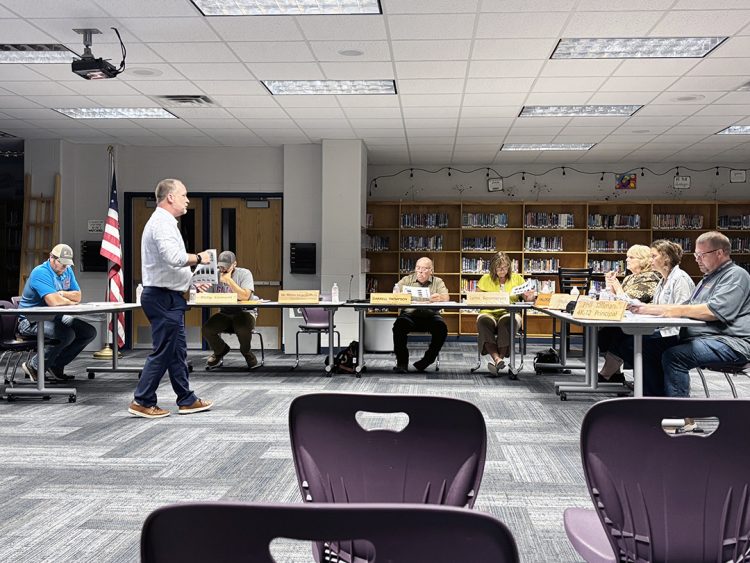Values rise, aids drop setting stage for referendum needs


The Gilman school district is getting creative by finding funding solutions in preparation for an impending referendum proposal. At their regular meeting on Monday, July 21, the board heard a presentation from district administrator Walter Leipart regarding the trajectory of the district and different avenues in which the school has been attempting to save money in order to ask less of the community's taxpayers.
Due to high property tax valuations in the village the school is seeing a drastic reduction in state aid, the state’s way of saying that a high value community should be able to afford to maintain their school with limited state support. But while property values are high and taxes continue to climb, without intervention some of the most vulnerable citizens in the village, its children, will pay the highest price.
The first step is a switch in employee health, dental, vision, and long-term disability (LTD) insurance that will save the district thousands. A change like this could involve a decrease in employee benefits and an increase in employee costs, something that would save the district money by taking it from the pockets of school staff members. In this case, however, the district is able to save money while investing in the overall wellbeing of its staff simultaneously.
“Our experience was extremely favorable last year, those are the best years to go out for quotes, you have more leverage when you have a good year than you do a bad year,” said Leipart.
School employees utilized their health insurance less during the 2024-2025 school year, a savings that the district was able to pass to their insurance carrier. Leipart and the team used those positive numbers to negotiate rates with a different insurance company, ultimately asking the board to authorize a contract with USI, a large-scale insurance carrier able to offer more exclusive rates due to its size.
“To be honest we were a little reluctant,” Leipart said. “We don’t want to have any changes in benefits, we want the same or better.”
The district had budgeted for an additional expense of $32,000 and an out-ofpocket cost of $4,400 to employees for the 2025-2026 school year, but with the switch to USI and GHT insurance services, the school’s cost goes down to $23,270 and just $3,100 for employees.
“That’s like a $50,000 swing,” said board member Holly Bacha.
In addition to saving money for the district and staff, the insurance offers a statewide network with a couple of exceptions for providers in the Madison area. The school will continue to offer payouts for employees that elect not to take the district’s insurance with a $4,000 kickback for a family plan and $2,000 for a single plan. The school will offer an online seminar for staff and their families to learn more about their new benefits and cost savings.
As with any switch insurance carriers, the plan may come with some changes to prescription medication coverage for which GHT is prepared; they’ve created a hotline specifically to help members understand and navigate medication coverage.
“There is no downside to this,” said Leipart. “We want to reduce costs to bring that referendum down as far as we possibly can.”
Rather than providing staff members with a card similar to an HRA plan for dental coverage as was done last school year, the district plans to enroll with Delta Dental, a savings of about $9,000 for the school and an increase in employee coverage from $1,000 to $1,500, a win for all.
The board voted to change health, dental, vision and LTD insurance unanimously.
And they didn’t stop there. The success of eSucceed, the district’s virtual charter school, has provided the district with money it would not otherwise have. This is especially significant as this money flows into the district regardless of how much aid the state determines the school should be eligible to receive. This helps to give the school some independence from the state and save taxpayer money when considering a referendum.
Without the implementation of eSucceed, the district would be forced to request a total school-based tax levy of $3,432,527, an 18.70% change from the current referendum leading to a 13.05% increase in the tax rate for taxpayers. Instead, the district will bring that total school-based tax levy down to $3,098,523, a 7.07% change that lowers the difference in the tax rate to 1.97%.
“We would have to think about education differently,” said Leipart of the future of the district without eSucceed. “I believe we can go with a $900,000 referendum.”
He stated that any surplus could be under-levied at the board’s discretion. “So basically people are just agreeing to keep paying what they’ve been paying?” Bacha asked. Leipart stated that taxes have gone up, and while the school plans not to request more referendum money than it already has, citizens will still pay higher taxes due to increased property values.
Leipart and director of business services Cheryl Rosemeyer are also looking at ways to create a surplus between Fund 99 and Fund 10 related to eSucceed now that the charter school is generating revenue for the district. He stated the amount of that revenue is $112,642.
The board did hear some good news that came from the recent signing of the state budget which includes additional money for open enrollments into the district. Leipart reported that the school could see an increase of roughly $150,000, without growth, from open enrollments alone. He encouraged the board to look towards open enrollments to help provide the school with additional breathing room.
Though there is an opportunity for some relief within the state budget via open enrollments, the state continues to withhold $31,402 due to be released to the school from Title II which focuses on improving student achievement by increasing the number of effective educators. Another $18,478 is being withheld by the state stemming from Title IV which was designed to help support activities that provide a well-rounded education, improve school conditions for learning and enhance the effective use of technology. The total withheld by the state is $49,880.
The district will start the referendum process in November.
In other business, the board:
• Heard that Gilman coach Robin Rosemeyer has been selected to the 2026 Wisconsin Football Coaches Association Hall of Fame. Rosemeyer will be honored on April 16, 2026, in Middleton.
• Discussed the 2024-2025 end of year achievement gap reduction (AGR) report. The AGR is a program which asks participating schools to implement one of three strategies: one-to-one tutoring provided by a licensed teacher; instructional coaching for teachers provided by a licensed teacher; or maintaining 18:1 or 30:2 classroom ratios and providing professional development on small group instruction. This program applies to students from kindergarten through third grade. Gilman does one-on-one tutoring provided by a licensed teacher as a part of their participation in this program, one benefit of smaller class sizes due to declining enrollment.
“Our scores are ones we can definitely improve on,” said Leipart. He stated that oral reading fluency is the key determining factor for meeting reading achievement by the end of third grade. Leipart also said that expectations for kindergartners are higher compared to other grades as students in kindergarten have a wide range school-readiness; some went to pre-k and others were taught at home, while a few were not prepared for school.
He reported that the school has identified a number of children that could use additional support, and with smaller class sizes there are opportunities for teachers to hold one-on-one sessions with those students.
• Heard that there is a new Tax Incremental District (TID) in Gilman which reaches the Dollar General to the industrial park and covers Main Street. TID’s help attract new private investment to an area, stimulating economic development.
• Learned that the new bleachers have been delivered and the batting cage is under construction with holes dug and forms set up and turf scheduled to be delivered this week.
• Was told that the ribbon cutting on the solar panels was scheduled to take place on Tuesday. The panels will save the school $20,000 a year paying off in almost eight years.
• Heard about revisions in the student/ parent handbook due to changes within the Department of Public Instruction (DPI) that no longer allow open campus activity. Now students can take a first semester work-based class with options for leaving early in the second semester.
Another alteration in the extracurricular code calls for fundraisers to go through the principal so the district is kept aware of goings-on. The school will also take a look at whether or not they will allow students to take two sports at once. “Because we’re a small school we may really want to see students taking two sports,” Leipart said.



